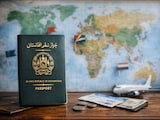Prime Minister Narendra Modi on Saturday spoke to Group Captain Shubhanshu Shukla, who is the first Indian astronaut to reach the International Space Station (ISS).
The nearly 18-minute dialogue between PM Modi and the 39-year-old Indian astronaut, who is the second Indian to go to space in 41 years and the first since Rakesh Sharma's eight-day sojourn in 1984, was rich in emotion, science, and national pride.
Expressing the collective pride of 140 crore Indians, PM Modi told the Indian astronaut: "Today you are farthest from your motherland but you are closest to the hearts of Indians."
He congratulated Mr Shukla on his successful mission and asked about his well-being.
Mr Shukla, visibly moved, responded with gratitude, affirming that he was safe and feeling well, crediting it to the blessings and support of the nation.
The astronaut described his journey to the ISS as not just a personal achievement but a symbolic leap for the entire country.
"This small journey from Earth to 400 kilometres above is not only mine - it is the journey of our country," he said.
Reflecting on his childhood, he shared that he never imagined becoming an astronaut, but under the current leadership, India now offers such dreams a chance to become reality.
In a lighter moment, PM Modi asked if Mr Shukla had shared Indian food with his international colleagues. In response, Mr Shukla said he had brought carrot halwa, moong dal halwa, and mango juice, which were well received by his fellow astronauts.
"Everyone liked it very much," he said, adding that they hoped to visit India one day to experience its culinary richness firsthand.
The conversation then turned philosophical as PM Modi remarked on the ancient Indian tradition of undertaking a "parikrama", with Mr Shukla actually doing a circumambulation or orbiting the Earth.
The Prime Minister asked what part of the planet Mr Shukla was currently passing over.
Though the astronaut didn't have the exact coordinates, he said a little while ago they had passed over Hawaii. He described the awe-inspiring experience of orbiting the Earth 16 times a day, witnessing as many sunrises and sunsets. Traveling at 28,000 kilometres per hour, he noted, adding with a tinge of national pride, suggesting "this speed shows how fast our country is moving forward".
When asked about his first thoughts upon being in space, Mr Shukla shared a profound realisation: "From space, you don't see any borders. The Earth looks united." He emphasised the vastness of India, which appears much larger from orbit than on a map, and spoke of the deep sense of unity and shared humanity that space evokes.
"Jab pehli baar Bharat ko dekha, Bharat sach mein bohat bhavya dikta hain, jitna ham map pe dekhten hain, usse kahin jyada bada (When we saw India for the first time, we saw that India looks very grand, very big, much bigger than what we see on the map)," Mr Shukla told the Prime Minister, bringing back memories of Wing Commander Rakesh Sharma's "saare jahan se achha Hindustan hamara" remark in 1984 when PM Indira Gandhi had asked him how India looks from space.
PM Modi then enquired about the challenges of adapting to life in microgravity. Mr Shukla explained that despite extensive training, the real experience was vastly different.
"Even small tasks become difficult," he said, noting that he had to tie his feet to stay in place during the conversation. Sleeping, drinking water, and even moving around required new techniques. "It takes a day or two to get used to it," he added. He showed how the microphone was floating away from him as he spoke.
The Prime Minister highlighted India's unique blend of science and spirituality, asking whether mindfulness and meditation helped in space.
Mr Shukla affirmed that they played a crucial role in managing stress and making sound decisions. "The calmer you are, the better you can make decisions," he said, advocating for the integration of mindfulness in high-stress environments like space missions.
On the scientific front, Mr Shukla proudly revealed that he was conducting seven Indian-designed experiments aboard the ISS. The first, scheduled for today, involved stem cells and aimed to understand muscle loss in microgravity - a study with potential applications for elderly care on Earth.
Another experiment focused on the growth of microalgae, which could contribute to food security due to their high nutritional value and rapid growth in space.
PM Modi praised the scientific ambition of the mission and noted how Chandrayaan's success had already sparked a wave of interest in space among Indian youth. He said Mr Shukla's journey would further fuel that passion.
Mr Shukla, in turn, encouraged young Indians to dream big and persevere. "There is no one way to success," he said. "But one thing is common-never stop trying."
As the conversation neared its end, PM Modi gave Mr Shukla some "homework": to document his experiences for the benefit of future missions, including Gaganyaan, which is India's upcoming human spaceflight program and the Bhartiya Antariksha Station and to send an Indian to the Moon.
Mr Shukla agreed, saying he was absorbing every lesson "like a sponge" and would apply them to accelerate India's space ambitions.
In a deeply emotional closing, Mr Shukla reflected on the collective achievement of the mission. "This is not just my personal accomplishment-it is a collective achievement for our country," he said.
He urged every child and youth to believe that "the sky is never the limit". He also revealed that the Indian flag now proudly adorned the ISS, a moment that filled him with immense pride.
PM Modi ended the conversation by extending his best wishes to Mr Shukla and his team. "Take care of yourself. Keep increasing the respect for Mother India," he said.
Mr Shukla responded with a heartfelt "Bharat Mata ki jai," echoing the sentiment of a nation that now sees its dreams orbiting the Earth.















